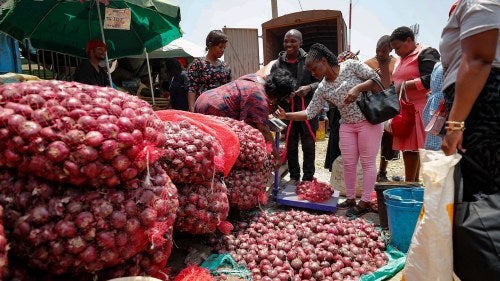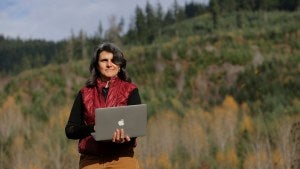Agricultural AI, Kicked Out, and Soaring Prices
Check out our roundup of the week's top news and research in food, agriculture, and global development.

Top Story
Export Restrictions Raise Global Food Prices
Global food prices are on the rise due to an increasing trend of countries enacting export restrictions, ranging from taxes to outright bans on key food products. Food supply instability due to climate change, the war in Ukraine, and El Niño have pushed countries to protect domestic supplies. Countries dependent on food imports are most at risk from these restrictions and the subsequent price increases.
Council Insights
Agricultural AI
“Gender mainstreaming offers a framework for future gender-responsive AI solutions to ensure agricultural AI is truly accessible,” writes Molly Shields in our most recent Global Food for Thought blog. “It is naïve to believe agricultural AI will fade, and for that reason alone, the agricultural industry must commit to gender mainstreaming.”
 Food and Agriculture
Food and Agriculture
Food and Agriculture
Kicked Out
Arizona Governor Katie Hobbs announced that the state will terminate land leases for farms owned by a Saudi Arabian company to “protect Arizona’s water future.” The company had been using the land to grow water-intensive alfalfa to feed dairy cows back in Saudi Arabia after the kingdom banned the cultivation of alfalfa in 2018 in an effort to preserve water.
Expedited Grain
Ukraine, Poland, and Lithuania have agreed on a deal to expedite Ukrainian grain exports. The agreement facilitates the transport of grain through Poland and shifts the grain inspection point from the Ukraine-Poland border to a Lithuanian Baltic Sea port. The announcement follows months of tension between Ukraine, Poland, and other bordering countries regarding Ukrainian grain exports into Europe.
Soaring Prices
Ghana is experiencing its worst economic crisis in decades, causing food prices to rise sharply and increasing the number of food insecure people. Many low-income households now spend more than half of their income on food, and receive minimal government assistance, if any at all.
Deeper Dive
Foreign Farmland Ownership Debate
Arizona’s expulsion of a Saudi Arabian farming company is part of a growing discussion about foreign ownership of US agricultural land. Lawmakers have held hearings on the subject and introduced bills that prevent farmland purchases by US geopolitical rivals like China, Iran, North Korea, and Russia. Foreign entities own 3.1 percent of U.S. agricultural land, with Canada, the Netherlands, Italy, and the UK as the top holders.
Resilience
Feeding a Nation
Ongoing instability and conflict in northern Mozambique have disrupted local food systems, leaving an estimated 900,000 people in the province food insecure. Farming and fishing equipment is regularly destroyed in the conflict, and farmers and fishers are increasingly vulnerable to attacks from insurgent groups. Organizations like the Global Alliance for Improved Nutrition have been working with local partners to strengthen and repair the food system by supporting entrepreneurship in nutritious food businesses.
DC Report
EATS (An Act)
A group of Congressional lawmakers is advocating for the inclusion of the Ending Agricultural Trade Suppression Act, also known as The EATS Act, in the 2023 Farm Bill. The EATS Act aims to nullify state laws affecting agriculture in other states, jeopardizing over 1,000 public health, safety, and animal welfare laws. Critics fear it may increase the risk of zoonotic diseases and set a concerning precedent for future agricultural reforms.
Big Actors
NYSE vs Climate
JBS, the world's largest meat producer with annual revenues exceeding $50 billion, is seeking a listing on the New York Stock Exchange (NYSE) to expand its access to capital. Environmental activists have raised concerns about the company's environmental practices and corporate governance, aiming to block its NYSE listing. JBS is facing criticism over its significant carbon dioxide and methane emissions, deforestation linked to the cattle industry, and lack of transparency in disclosing data related to animal processing and emissions.
Big Ideas
Fair Cocoa
Fairafric, a Ghanaian chocolate company, aims to disrupt the cocoa industry's status quo by manufacturing chocolate locally, keeping the production process in the cocoa-growing country. While Africa produces 70 percent of the world's cocoa beans, it manufactures only one percent of the chocolate products, primarily controlled by multinational corporations. Fairafric seeks to raise $1 million for expansion, emphasizing the potential for greater equity in the industry by keeping production and profits within cocoa-producing nations.
Ask an Expert
How can data help achieve food security in African cities?
“As we search for solutions for food insecurity in a highly urbanizing Africa, data holds the reins, steering us towards well-crafted strategies. In this journey towards safeguarding urban food security, several vital waypoints come to light. Championing data awareness, setting up frameworks for open data sharing, and enhancing research and data literacy are all steps that can weave into a larger tapestry. Together, these actions chart a course towards crafting urban landscapes that are food secure.”
—Nonresident Fellow Jones Kanjira in GFFT


Have a question about food and agriculture? Ask one of our experts at the Center on Global Food and Agriculture to get an answer in next week's Global Food for Thought!
Council Events
Did you miss one of our previous livestreams? Don't worry! They are all available on our website to watch at any time.
Other Upcoming Events
Micronutrient Forum: 6th Global Conference
Date: October 16 – 20
World Forum on Urban Forests
Date: October 16 - 20
Serving Up Sustainability: From Restaurants to the Home Kitchen
Date: October 18
Time: 3:00 – 4:30 p.m. CT
2023 National Agricultural Marketing Summit
Date: November 12 - 14
Martin J. Forman Memorial Lecture: Tackling Obesity and Noncommunicable Diseases in Mexico
Date: November 21
Time: 9:00 – 10:30 a.m. ET
Land Acknowledgement Statement
The Center on Global Food and Agriculture recognizes it occupies the ancestral land of the Kiikaapoi, Peoria, Kaskaskia, Bodwéwadmi, and Myaamia people. Indigenous communities around the world disproportionately experience the pressures of climate change, global conflicts, and the COVID-19 pandemic, while simultaneously stewarding 80 percent of the world’s biodiversity. These Indigenous tribes and nations are the original owners of this land and continue to be systemically erased by policies and practices that ignore their histories. To learn more about Indigenous foodways and practices, check out our 2022 blog series "Stewardship, Sovereignty, and Solutions."






